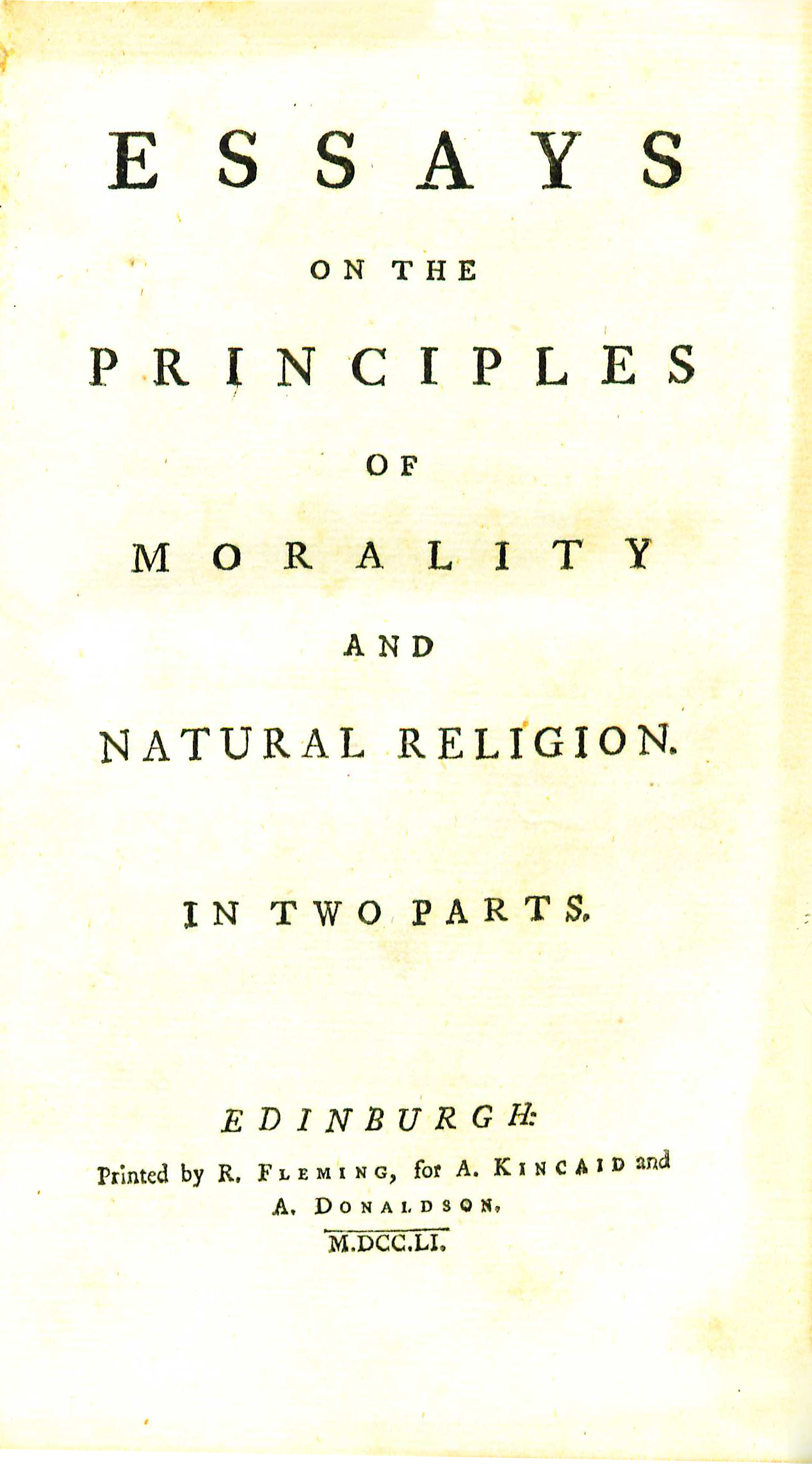Essays on the Principles of Morality and Natural Religion
by Henry Home, Lord Kames
| Essays on the Principles of Morality and Natural Religion | |
|
Title page from Essays on the Principles of Morality and Natural Religion, George Wythe Collection, Wolf Law Library, College of William & Mary. | |
| Author | Henry Home, Lord Kames |
| Published | Edinburgh: Printed by R. Fleming, for A. Kincaid and A. Donaldson |
| Date | 1751 |
| Language | English |
| Pages | 3, 394 |
| Desc. | 8vo (21 cm.) |
Henry Homes, Lord Kames, (1696-1782), a leader of the Scottish Enlightenment,[1] began his career as an advocate and later became a notable judge and writer. Kames' writings, which demonstrate his philosophical approach to the law, helped shape the Scottish legal system. In 1751, his Essays on the Principles of Morality and Natural Religion caused members of the Scottish church to argue for his excommunication. Political smears and Jacobite claims did not prevent Home from ascending to the bench, however. Historical Law-Tracts was published in 1758, and "his principal work in the eyes of Scottish legal historians", Principles of Equity, in 1760.[2] Lord Kames was appointed commissioner of justiciary in 1763. His judicial and writing careers continued until 1782, the year of his death.[3]
Published in 1751, Essays on the Principles of Morality and Natural Religion is considered as one of his most widely-regarded works. The first part is largely concerned with “the principles and foundations of morality and justice, attacking Hume’s moral skepticism and addressing the controversial issue of the freedom of human will.”[4] In the second part, Kames supports a natural theology; he focuses on epistemology and metaphysics to offer a view of humans as possessing a morality and senses benevolently bestowed rather than having been born out of self-interest.
Evidence for Inclusion in Wythe's Library
Brown's Bibliography[5] includes the first edition (1751) of Kames' Essays on the Principles of Morality and Natural Religion based on notes in Thomas Jefferson's commonplace book. Dean's Memo[6] also lists the first edition in the last section of her bibliography with the caveat, "[a]lthough there is no proof that Wythe owned any of them, they are at least representative of his time."[7] The Wolf Law Library purchased a copy of the first edition.
Description of the Wolf Law Library's copy
Newly rebacked in calf preserving original calf boards with new morocco label on spine and five raised bands. Purchased from Loome Theological Booksellers.
View the record for this book in William & Mary's online catalog.
References
- ↑ Alexander Brodie, "Scottish Philosophy in the 18th Century" in Stanford Encyclopedia of Philosophy, accessed October 19, 2013, .
- ↑ Alastair J. Durie and Stuart Handley, "Home, Henry, Lord Kames (1696–1782)" in Oxford Dictionary of National Biography (Oxford University Press, 2004- ), accessed October 9, 2013.
- ↑ Ibid.
- ↑ Essays on Principles of Morality and Natural Religion, Project MUSE, accessed September 30, 2013.
- ↑ Bennie Brown, "The Library of George Wythe of Williamsburg and Richmond," (unpublished manuscript, May, 2012) Microsoft Word file. Earlier edition available at: https://digitalarchive.wm.edu/handle/10288/13433.
- ↑ Memorandum from Barbara C. Dean, Colonial Williamsburg Found., to Mrs. Stiverson, Colonial Williamsburg Found. (June 16, 1975), 18 (on file at Wolf Law Library, College of William & Mary).
- ↑ Ibid, 16-17. Dean bases this part of her bibliography on titles mentioned in Alan McKinley Smith's dissertation, "Virginia Lawyers, 1680-1776: The Birth of an American Profession" (PhD diss., The Johns Hopkins University, 1967).
External Links
Read this book in Google Books.
